Compromises of Theistic Evolution
Genesis 1:1
When I was a teenager I was briefly a theistic evolutionist.
I thought it seemed reasonable.
It melded the ideas of evolution that I was learning in school and creation that I was learning at church.
Why not have God guide the evolutionary process?
It accounts for the scientific evidence while overcoming the problems that the theory of evolution has.
Well, that phase didn’t last long.

The problems of evolution are fundamental flaws.
It especially is flawed if one believes the Bible.
Theistic evolution compromises too much: science, theology, scripture.
In one sense, to compromise has a good connotation.
You want to compromise with your spouse.
You have to compromise often in politics to get anything done.
But in another sense, it has a bad connotation.
When armor is compromised or when integrity is compromised—it becomes worthless.
Theistic evolution compromises in this negative sense—science and your faith then become worthless.
Body.
A description of evolution states that it is a completely natural process.
We see this in a quote from Dr. George Simpson from Harvard in 1960.
Theistic evolution compromises this description and a general understanding of the theory by invoking the miraculous, the supernatural.
The question is where would you invoke the miraculous in the evolutionary model?
It cannot be invoked since evolution is described as completely natural.
That doesn’t stop people from trying, but before we consider that….
Reproduceability and falsifiability.

These are two hallmarks of real science.
In order for something to be called science it must have these two traits.
For something to be reproduceable, that means we can do the experiment again and get the same results.
Miracles, by their very nature, cannot be reproduced, unless of course you can do the miracle.
For something to be falsifiable, that means that we can run some sort of test to prove an hypothesis false.
For example, we could prove the theory of gravity false by running a simple test—hold something out and let it go.
The theory of gravity states that the object will fall at an acceleration rate of about 32 ft/s2 here on Earth.
What we have established is that test does not disprove the theory of gravity.
But if the object went up, then we would know the theory of gravity was false—falsifiable.
Miracles, again, by their very nature are extremely difficult to falsify, especially when they are events of the past.
Interestingly enough, the theory of evolution does not meet these requirements either, and should not be called science.
On the other hand, the Bible is falsifiable—we could run a test to prove that it isn’t the Word of God.
For instance, if we found a credible contradiction, the Bible would not be God’s Word.
Since we do not find one, this test does not disprove that the Bible is the Word of God.
So TE compromises science by not being reproduceable or falsifiable.
We note there are at least two areas that one might try to invoke a miracle in an attempt to prove TE: abiogenesis and genetic mutations.
Abiogenesis – getting life from non-life.

Science cannot adequately answer how organic materials could come from the inorganic.
Perhaps you would you invoke a miracle here? It would certainly solve this problem.
Rest assured, whatever hypotheses that secular scientists come up with to explain abiogenesis will not include anything miraculous.
So why should we take just a portion of their naturalistic theories? These theories compromise true science.
Mutations adding genetic material.
In order for evolution to work, helpful mutations must occur to contribute to one’s survival.
To get from single-celled organisms to the complexity of human beings, these mutations must add genetic material.
Mutations have been observed, but none that add genetic information.
This is perhaps the biggest lie of evolutionary theory, that such genetic mutations have occurred.
Instead, these mutations only take away genetic material, so instead of going from single-celled organisms to the complexity we are today, we would go in the opposite direction.
So would we invoke the miraculous with every helpful mutation that advanced the evolutionary process?
This turns God into a god-of-the-gaps …
God is not a god-of-the-gaps.
Define: This idea suggests that in any theory that we do not fully understand, God must have done something miraculous—He filled in the gaps.
Dr. Neil deGrasse Tyson believes that if we relegate God to this, then He will get smaller and smaller as science knows more and more—and that’s true.
So God must not only be in the places we do not understand but involved in all processes, both natural and supernatural.

This idea of the God-of-the-gaps is not only bad science, but bad theology.
It is bad science because it merely means we do not understand it … yet. Ideally, science is ever-progressing, learning new things. Simply because we do not understand it yet, does not necessarily imply it is miraculous.
It is bad theology because it implies several erroneous things about God.
Theistic evolution implies God did not create things perfectly.

At the end of the Creation week, the Bible says it was “very good” (Gen. 1:31).
T.E. requires long periods of time for God to have gotten it right.
My God is not so incompetent that He cannot create things right the first time.
Evolutionists like to argue against this because of all the imperfections they perceive in nature.
They do not consider that maybe God designed things to eventually fail (e.g. death).
They ignore the effects that sin and the curse of sin, decay and death, have on the natural world—including the effects of a global flood.
Things are not perfect today, but that doesn’t mean it didn’t start out perfect.
Theistic evolution removes the need for a Savior.
If T.E. were true, the first 11 chapters of Genesis would not be literal.

Then there is no Adam and Eve, no Garden of Eden, no perfect world.
If there is no literal Adam, then sin has either never entered into the world or has always been here (therefore not “very good” when finally completed).
Paul writes that “through one man sin entered the world, and death through sin” (Rom. 5:12).
So T.E. eliminates the need for the second Adam, Christ (1 Cor. 15:45-49).
Theistic evolution turns God into an irrational being.

Why send His Son to die here on earth if it weren’t absolutely necessary?
Why spend millions and billions of years forming the cosmos when His top creation, humans, will only be around for a very small fraction of that time?
Why would it take an omnipotent being that long to get everything right?
No, God is a God of reason and logic, otherwise we could never know the truth that would make us free (John 8:32).
Compromises Scripture.
There are some instances of metaphorical and poetic language used in Scripture.
A few weeks ago we talked about how, as odd as it sounds, we cannot and should not take everything in Scripture 100% literally.
It is relatively easy to ascertain which passages are meant to be taken literally and which aren’t.
The first thing we should do when interpreting Scripture is always consider the genre.
Genesis, for the most part, is clearly meant to be taken literally, Gen. 1-11 and 12-50.
If we do not take it literally, we are compromising the integrity of biblical interpretation—then we can interpret anything in Scripture any way we like.
The language in Genesis 1 clearly indicates ~24 hr periods of time.
We see a common refrain: “So the evening and the morning were the _____ day” (Gen. 1:5b, 8b, 13, 19, 23, 31b).
If these days indicate eons of time, those were some long evenings and mornings.
No doubt things would have died off before having a chance to evolve.
This, in conjunction with the Hebrew word for “day” (yom), shows that this was definitely a 24-hr period of time.
The Hebrew word can be used figuratively (Gen. 2:4).
This is similar to us saying, “Back in my day.”
But since evening and morning are clearly indicated, it must be a reference to a literal 24-hr day.
Other passages of Scripture confirm a literal interpretation.
Exo. 20:11; 31:17 – God is issuing the Ten Commandments and the Sabbath Law.
This is the theological significance of creating the universe in six days.
Not only for the Sabbath of the Jews, but the fulfillment of the Sabbath in Christ (Col. 2:16-17).
Genealogies—without them, the Jews, and consequently Jesus, are nothing.
Ezra (probably) confirms the genealogy before Abraham (1 Chron. 1:1-27).
Luke confirms the genealogy of Jesus all the way to Adam (Luke 3:23-38).
Both Isaiah and Ezekiel speak of Noah.
Isaiah affirms the promise of God not to flood the world again (Isa. 54:9).
Ezekiel affirms the righteousness of Noah (Eze. 14:14).
Jesus and Peter confirm the Flood of Noah to be literal.
Jesus in relation to judgment (Matt. 24:37-39; Luke 17:26-27).
Peter in relation to judgment, but also as the antitype which now saves us—baptism (1 Pet. 3:20-21; 2 Pet. 2:5).
Writer of Hebrews mentions the faith of pre-Abrahamic figures—how useless would their faith be if this were not describing real people and real events?
Abel (Heb. 11:4).
Enoch (Heb. 11:5).
Noah (Heb. 11:7).
If we feel we can compromise Scripture at the very beginning, where else might we be tempted to compromise it?
If you believe in God and you believe in the Bible, theistic evolution is totally and utterly incompatible with those beliefs.
It compromises too much—science, theology, and scripture.
Another place we can never compromise is in the doctrine of salvation.
We need a Savior—Jesus.
The Old Testament shows us that we need a Savior (Gal. 3:24).
It does this from the very beginning, showing us the origin of sin and the promise of a Savior (Gen. 3:15).
Obey the gospel today and take advantage of His saving grace!
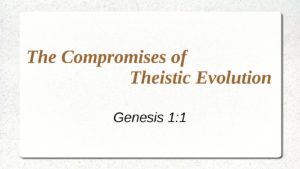
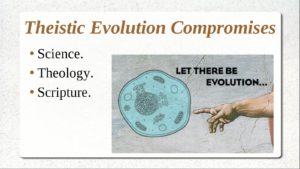
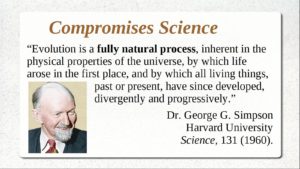
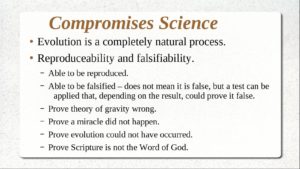
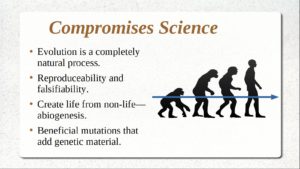
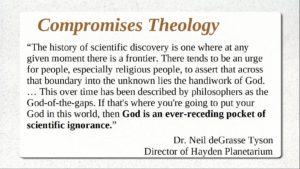
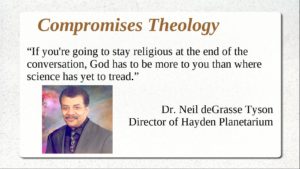
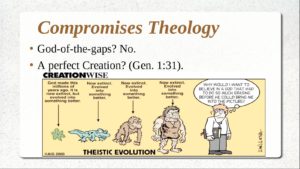
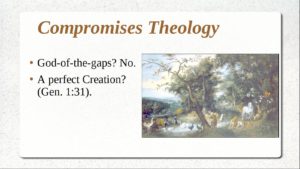
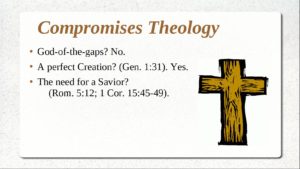
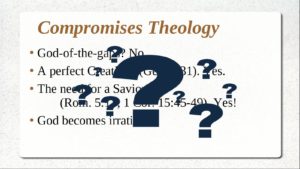
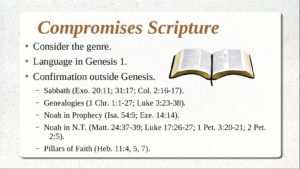
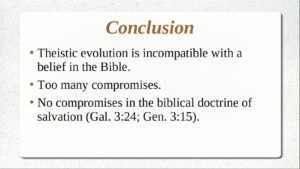
Boy did I needed to hear this. I talked to Sam the other day because My youngest brother watches the history channel and takes their teaching as gospel. Sam gave me wisdom on the subject and guided me on things to do and say to encourage my brother to turn around and to learn the truth. Then I listened to this and it blew my mind. He and I will be having a study. t”s awesome how God puts things in your path at the very moment you need it. Such an amazing God.